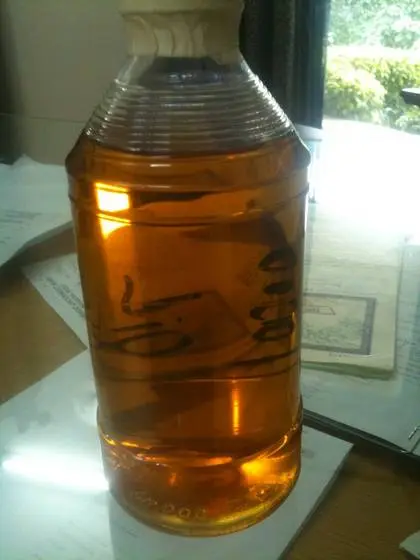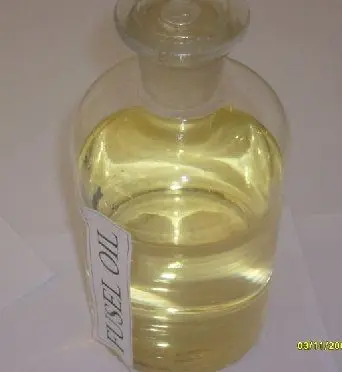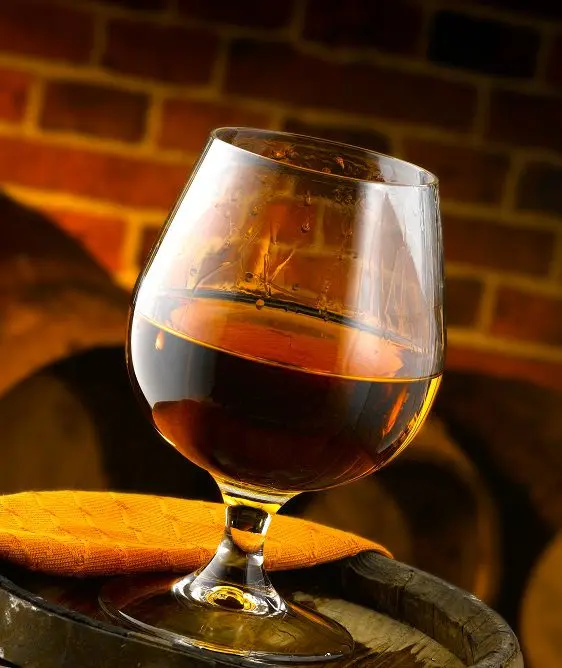Fusel oils can be called the “soul” of any alcoholic beverage. In many ways, they determine the taste, smell, color and strength of a hangover. The inhabitants believe that these impurities are undesirable, harmful to health and spoil the taste. In fact, everything is much more complicated, in most cases their presence is vital, and proper cleaning eliminates problems.
Fusel oils – a group of substances of an oily consistency of light yellow or red-brown color with an unpleasant odor, which is a by-product of alcoholic fermentation of sugar, fruit or starch-containing raw materials. In one concentration or another, they are contained in every alcoholic drink (an exception is pure rectified alcohol).
To get fusel oil at home, it is enough to pour unrefined moonshine into a spoon, set it on fire and wait until the burning is over. The bad-smelling liquid remaining in the spoon will be “fussy” (popular name). Still similar substances can be seen in the steamer of the moonshine still after distillation.
Fusel oils filtered during rectification (industrial production of alcohol) are not waste, but are used to produce amyl alcohol, which in turn is used as a solvent in the confectionery and dairy industries.


The composition of fusel oils includes about 40 substances, conventionally divided into two groups. The first group contains liquids whose boiling point is lower than that of ethyl alcohol (78.4°C), these are acetic-butyric ester, acetaldehyde and acetone. The second group is represented by substances with a boiling point above 78.4°C: propyl, isopropyl, amyl, isoamyl, isobutyl alcohols, furfural, acetyl and other toxic compounds. The most dangerous is isoamyl alcohol (С5Н4ОН), which accounts for up to 60% of the volume of fusel oil. When concentrated isoamyl alcohol gets on the skin, the affected area first turns red and itches, then bubbles appear filled with a clear liquid.
The benefits and harms of fusel oils
The composition and concentration of fusel oils are influenced by: raw materials, type of yeast, fermentation temperature and preparation technology (distillation, rectification or lack of distillation). From this point of view, the purest drink is vodka, poorly purified – whiskey.
| Drink | Fusel oil content (mg per liter) |
|---|---|
| Vodka | 5-15 |
| Beer | 25-100 |
| Wine | 100-630 |
| Cognac | to 2000 |
| Whiskey | to 4000 |
The problem is that it is fusel oils that endow spirits with characteristic organoleptic properties. Without these substances, cognac and whiskey will turn into alcohol diluted with water (the effect of aging in oak barrels is also significant, but less), and the taste of wine or beer will change beyond recognition. On the other hand, an excessive amount of fuselage causes intoxication of the body, poisoning, and a severe hangover.
The harm and benefits of fusel oils are relative – they are determined by the composition and (or) concentration of substances in the drink. Every self-respecting manufacturer tries to remove toxic impurities as much as possible, leaving only the necessary and harmless ones that determine the organoleptic properties. Therefore, the technology for the production of vodka, wine, beer, cognac, whiskey and tequila is different, and the quality of drinks depends on the purification methods used.

For example, it is incorrect to compare harm from whiskey and vodka. At first glance, it seems that whiskey, initially containing 260-400 times more fusel oils, is much more dangerous. But with proper cleaning, whiskey will be even more harmless than vodka (argument in the next paragraph). It is possible to compare the quality of alcohol of the same type, for example, two manufacturers of cognac, but when assessing the danger of different alcohol, it is difficult to draw the right conclusions.
Until recently, vodka was considered the most harmless alcoholic drink, since due to rectification it contains a minimum of fusel oils. But at the same time, it remained unclear why 70% of people suffering from alcohol addiction are vodka alcoholics. A study by Vladimir Pavlovich, a professor at the Narcology Research Institute of the Ministry of Health of the Russian Federation, shed light on this issue.
It turns out that some fusel oils protect the body from the harmful effects of alcohol by causing the liver to become active before the alcohol begins its destructive effects. The purer the poison (in our case, ethyl alcohol), the more dangerous and addictive it is. It is a pity that few people know about these findings.
Purification of fusel oils
Any homemade alcoholic drink contains some amount of harmful fusel oils. But it is impossible to clean wine, beer or liquor from them without losing the taste. In this case, the only option is to use high-quality raw materials and strictly adhere to the cooking technology. For example, Isabella grapes release a lot of hydrocyanic acid during fermentation, therefore it is better not to drink a lot of such wine at a time or mix the must before fermentation with other varieties.
Sugar, fruit and malt distillates are well refined. To get started, I advise you to familiarize yourself with the six best methods for cleaning moonshine, which are used for sugar and grain raw materials.
The most effective method will help to remove fusel oils from fruit distillate (apple, grape, pear, plum, etc.) – double distillation of moonshine with separation of the output into fractions (“head”, “body” and “tails”), which is used in preparation of cognac, whiskey, Calvados and other spirits.









